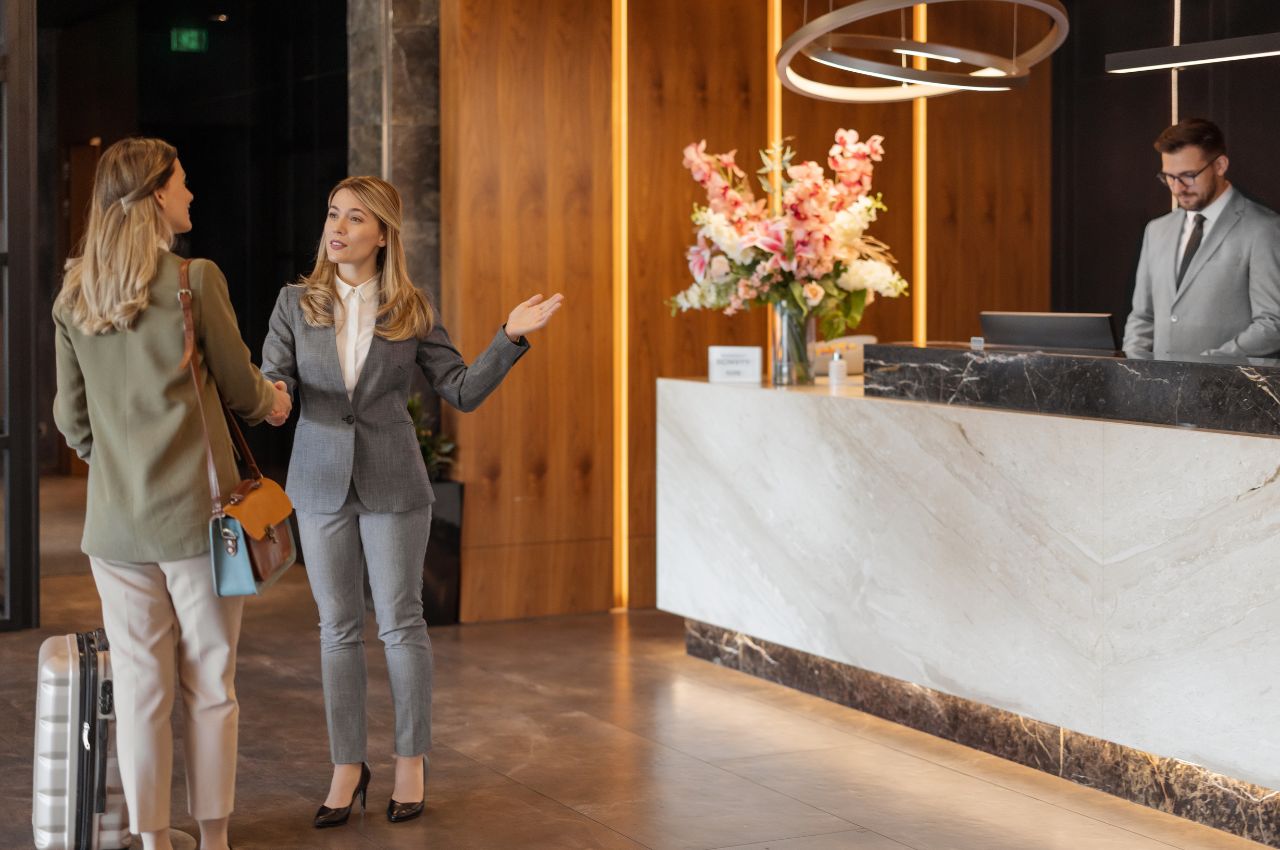Navigating the delicate waters of customer service in the hospitality industry often means encountering a diverse array of guest behaviors, some of which can be particularly challenging. Every hospitality professional knows the dread that accompanies dealing with a difficult guest. Whether it’s the persistent complainer, the unjustifiably angry customer, or those rare instances that may even warrant eviction, these situations test the limits of professionalism and patience. The ability to handle such guests gracefully is not just a valuable skill—it’s essential for maintaining the hotel’s reputation, ensuring the safety and satisfaction of all guests, and preserving the morale of the hotel staff.
Understanding Different Types of Difficult Guests
Difficult guests come in many forms, and recognizing the variety of challenges they present is the first step toward effective management. Annoying hotel guests might include those with incessant demands, unreasonable expectations, or a knack for finding fault in every aspect of their stay. Though often not malicious in intent, their actions can strain the patience of hotel staff and disrupt the tranquility of the hotel environment.
Angry hotel guests, on the other hand, express their dissatisfaction in more overt ways, from raised voices to outright confrontations. Their anger might stem from genuine service failures or personal grievances, and their aggressive behavior can intimidate staff and unsettle other guests.
Then there are situations where a guest’s behavior crosses the line into unacceptable territory, necessitating eviction. These are the rare but serious cases where a guest’s actions threaten the safety, security, or well-being of hotel guests and staff. Recognizing the signs that might lead to such drastic measures is crucial for every hospitality professional.
Annoying Hotel Guests
Dealing with annoying hotel guests requires a blend of empathy, diplomacy, and assertiveness. These guests often do not realize the impact of their behavior, so the challenge lies in addressing their concerns without escalating the situation. Strategies for managing such guests include actively listening to their grievances, however trivial they may seem, and offering solutions within the hotel’s policies and capabilities. It’s essential to validate their feelings, showing understanding and patience, while also setting clear boundaries to prevent their demands from overshadowing the needs of other guests.
Training staff in conflict resolution and customer service techniques equips them with the tools to transform potentially negative encounters into opportunities for positive engagement. Moreover, documenting these interactions can provide valuable insights for improving service and preventing future issues.
Angry Hotel Guest
Angry hotel guests pose a more direct challenge, as their dissatisfaction has boiled over into visible frustration or anger. The key to de-escalating these situations lies in remaining calm and professional, ensuring the guest feels heard and understood. Employing active listening techniques can diffuse tension, allowing the guest to express their concerns without interruption. Empathizing with their situation, apologizing for any service failures, and taking prompt, decisive action to remedy the issue can often turn an angry guest into a satisfied one.
It’s also vital to recognize when additional support is needed, whether from a manager or security, to ensure the situation is handled appropriately. Training programs that simulate these high-pressure interactions can prepare staff for real-life encounters, instilling confidence and fostering a team approach to problem resolution.
Can a Hotel Evict a Guest?
The question of eviction is a complex one, blending legal authority with ethical considerations. Yes, hotels do have the right to evict guests, but such actions are typically reserved for extreme cases where a guest’s behavior significantly violates hotel policies, poses a risk to the safety of others, or involves illegal activities. Circumstances warranting eviction might include destruction of property, disturbing the peace, non-payment, or other serious infractions.
Executing an eviction requires a delicate balance, ensuring that the process is carried out lawfully and respectfully. Hotels should have clear policies in place detailing grounds for eviction and the steps to be followed. Communication is key—informing the guest of the reasons for the eviction and providing them with an opportunity to rectify the situation if possible. If eviction becomes necessary, it should be conducted with the utmost professionalism, ideally involving hotel security or local law enforcement to ensure a smooth process that minimizes disruption and maintains the safety and security of all involved.
Preventing Conflicts with Hotel Guests
Preventing conflicts before they escalate is crucial in maintaining a harmonious environment within the hotel. Proactive measures include setting clear expectations at the time of booking and check-in, detailing hotel policies regarding behavior, noise, and property use. Transparent communication can prevent misunderstandings that might lead to disputes.
Training staff in conflict resolution and customer service excellence also plays a pivotal role in preventing guest conflicts. Empowering employees with the knowledge and authority to address guest concerns promptly and effectively can often defuse potentially difficult situations. Furthermore, creating a culture of attentive service, where guests feel listened to and valued, can significantly reduce the likelihood of guest dissatisfaction that might lead to conflicts.
Training Staff to Handle Difficult Situations

The foundation of successfully managing difficult guest interactions lies in comprehensive staff training. Staff at all levels should be equipped with the skills to recognize, address, and de-escalate challenging situations. Training programs should cover a range of skills, from communication and empathy to problem-solving and stress management. Role-playing exercises can be particularly effective in preparing staff for real-life scenarios, providing them with the confidence to handle difficult interactions gracefully.
Additionally, fostering a supportive team environment where staff feel comfortable seeking assistance when needed is essential. Encouraging open communication about difficult guest interactions and sharing strategies for handling such situations can contribute to a learning culture. Recognizing and rewarding staff for exemplary handling of challenging situations can also reinforce positive behaviors and motivate the entire team.
Building a Positive Hotel Culture
A positive hotel culture is instrumental in setting the tone for guest interactions and staff behavior. This culture should be rooted in respect—for guests, for employees, and for the property itself. Leadership plays a crucial role in establishing and nurturing this culture, setting expectations for service excellence and leading by example. Staff should feel valued and supported, understanding that their contributions directly impact the guest experience.
In this supportive environment, dealing with difficult guests becomes a shared responsibility, with team members empowered to make decisions that prioritize guest satisfaction while upholding the hotel’s standards. A positive culture encourages innovation in problem-solving and a willingness to go above and beyond, creating memorable experiences that guests will appreciate and remember.
Learning from Difficult Interactions
Every difficult guest interaction holds the potential for learning and growth. By reflecting on these experiences, identifying what worked well and what could be improved, hotels can refine their approaches to guest service. Staff debriefing sessions following challenging situations can facilitate this learning process, allowing team members to share insights and strategies that were effective in de-escalating conflicts or resolving issues.
Encouraging a mindset of continuous improvement among staff can lead to the development of innovative solutions to common challenges. Additionally, guest feedback, even when negative, is a valuable resource for understanding guests’ perspectives and identifying areas for enhancement. By embracing these learning opportunities, hotels can evolve their service models to better meet the needs and expectations of all guests.
Conclusion
Handling difficult hotel guests is an inherent challenge in the hospitality industry, but it’s also an opportunity for hotels to demonstrate their commitment to exceptional service. By understanding the types of difficult guests, implementing effective strategies for dealing with them, and fostering a positive hotel culture, hospitality professionals can navigate these challenges with confidence and grace. Training staff to manage difficult situations effectively and learning from each interaction are key to continuous improvement and guest satisfaction.
Embrace these strategies as an integral part of your hotel’s operation. Cultivate a culture of empathy, professionalism, and respect that permeates every guest interaction. Remember, the goal is not just to manage difficult situations but to transform them into positive outcomes that reinforce your hotel’s reputation for outstanding hospitality. Let’s commit to elevating the standard of service, making every guest feel valued, understood, and well cared for, regardless of the challenges that may arise.





